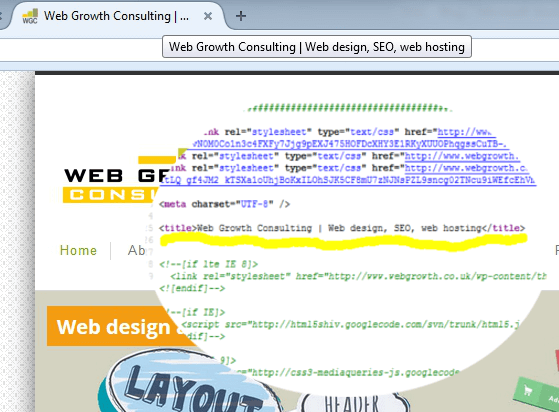The page title or title tag is one of the most important features of your website content for SEO. In theory, the main search engines Google and Bing pick up on keywords in the Title tag and page contents to work out what your page is about and whether and where it should be shown in the search engine results pages.
Here’s what Google says about title tags:
“Titles are critical to giving users a quick insight into the content of a result and why it’s relevant to their query. It’s often the primary piece of information used to decide which result to click on, so it’s important to use high-quality titles on your web pages.”
What is the title tag?
For those still a little lost about the title tag, this is part of the html code of your web page that doesn’t display directly on the page but shows up in the tabs on your web browser, search engine results pages and is often used by Google to extract and match keywords for search engine users. If it’s missing or badly constructed then you are missing out on the opportunity to place your website higher in search engine results pages.
For example here is the title tag for the home page of our website:
<title>Web Growth Consulting | Web design, SEO, web hosting</title>
In this case Google is picking up on our home page title tag which also contains a short summary of our main services. The title tags on other pages are different to reflect the contents of these pages. 
There will be times when you have done your keyword research, carefully constructed your title tags, spent time adding them to each page of your website and then Google completely ignores what you have done and constructs its own.
There is no way to prevent this from happening. Google reserves the right to review your title tag, compare it to your website and rewrite it for the purposes of search engine results pages. There are no hard and fast rules, but if your title tag is not being picked then it could be for the following reasons:
- Too long – the optimum length is between 55 and 70 characters, any more is a waste of time and search engines will ignore
- Keyword stuffing – don’t keep repeating variations of the same phrase as Google does not take kindly to being spammed.
- No branding – you might think that you can drop in a couple of extra keywords in the title tag at the expense of telling Google who you are but that can be ignored.
Here’s Google own advice about title tags:
- Make sure every page on your site has a title specified in the <title> tag
- Page titles should be descriptive and concise
- Avoid keyword stuffing
- Avoid repeated or boilerplate titles
- Brand your titles, but concisely
If Google does not pick up on your title tag then it does think it knows better and constructs one based on your page contents and the profile of the backlinks to your pages. It’s often not disastrous as Google is pretty good, no actually, pretty amazing at working out the contents of a web page and how it should match search engine queries. However by not following the guidance you aren’t in control and risk some of your pages not being indexed properly because of a badly constructed title tag.
Checking your title tag
If you use WordPress then we recommend the Yoast plugin as that automatically checks the length and keyword density of your title tag.
With anything else you can use the character count in Word or SEO company Moz has a title tag tool: https://moz.com/learn/seo/title-tag
Finally
Stick to these principle for you title tags:
- Use proper, one sentence titles that contain your brand name and your focus keyword.
- Your homepage your title should probably start with your brand name.
- Important keywords should be placed at the start of the title tag.






